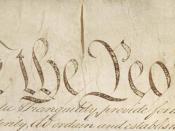The Constitution: Unity or Disunity?
The U.S. Constitution is looked upon as not only a legal bond, but as a unifying document that exemplifies the American desire for "life, liberty and the pursuit of happiness." From 1787, the year of its creation, until 1850, the Constitution helped to uphold these ideals, by ruling with the majority, but protecting the minority, as well as acting as a symbol of unity for the growing nation. In the decade before the Civil War, the Constitution's openness for wide interpretation as well as its lack of specificity on sectional issues such as states' rights and slavery led to the eventual disunion and the Southern secession.
For over 60 years prior to the Civil War, the Constitution was able to unify the Nation. After the Democrat-Republicans swept the Federalists of their offices in the Revolution of 1800, the Federalists, in their respect for the rule of the majority (as upheld in the Constitution) accepted defeat and left their positions peacefully (Amsco).
After Jefferson was elected in 1800, he went on to purchase land through a treaty with France in the Louisiana Purchase (1804) and doubled the size of the United States (Divine). This action, although barely, followed the Constitution in the executive rights it grants, and helped to unify the nation by increasing territory, nationalism and the spread of democracy. Supreme Court Justice John Marshall instituted judicial review, which could override decisions brought about by Congress; he then used this power to institute supremacy of the federal government above the state governments, as in McCulloch v. Maryland.
In leaving room for interpretation, the Constitution led many Northern abolitionists to believe it did not do enough to prevent the expansion, promotion and existence of slavery. The Free-Soilers felt the Fugitive Slave Act (1850), the Compromise...



Comment
its a good essay... involve good details that explains what the topic is about... you should ofcourse used better grammar skills... but overall, its a nice 85% grade, well thats in my opinion
1 out of 1 people found this comment useful.